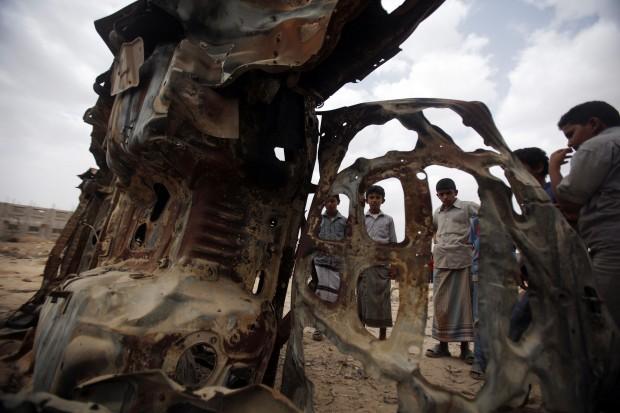Why the ‘Yemen model’ may not work in Iraq — or Yemen
Boys gather near the wreckage of car destroyed by a US drone air strike targeting suspected al Qaeda militants in the southeastern Yemeni province of Shabwa, February 3, 2013.
President Barack Obama sees success against al-Qaeda in Yemen, and wants to use the same model to overcome ISIS in Iraq.
Middle East watcher Gregory Johnsen thinks that's a bad idea; he's not even sure what Obama is seeing in Yemen should be called success.
"It just seems that the US doesn't have a very good grasp of what's happening on the ground in Yemen or what's happening on the ground in Iraq, or how to solve either of these problems," he says.
Johnsen says the US military strategy used to hunt al-Qaeda members in Yemen has been ineffective, or even counterproductive.
"About four-and-a-half years ago, when the US started this program of drone strikes, special forces advisors on the ground, al-Qaeda in Yemen numbered about 200 to 300 people. Now today, there are several thousand people. So what the US is doing in Yemen isn't working."
He notes that US drone strikes on al-Qaeda targets, in sparsely populated regions of Yemen, have led to civilian deaths and engendered ill-will among Yemenis.
"The problem for the US is that if they can't even hit the right targets in Yemen, when the targets are isolated, how do they hope to hit the right targets in Iraq, when the targets are sort of cheek-and-jowl with the civilians there," Johnsen says.
Johnsen notes that President Obama has praised Yemeni President Abd Rabu Mansur Hadi for being a "cooperative partner," something the US would like to have in Iraq or Syria. "But," Johnsen says, "Hadi might be better described as 'compliant.'"
"You don't have the same sort of compliant partner in Nouri al-Maliki, the president of Iraq, that you have in the president of Yemen. Maliki is someone who is very close to Iran, and is someone that President Obama and US officials have actually been looking to sort of push out in Iraq. The US isn't going to have the same sort of free hand in Iraq that they do in Yemen," he adds.
Johnsen observes that US authorities are eager to show progress toward peace after nearly 13 years of war in the Middle East.
"And what's happening is that US officials are so desperate for positive signs that they're looking at Yemen. And instead of seeing the reality on the ground — which is what they're doing isn't working — they're seeing success, and trying to export it to Iraq," he says. "Unfortunately, it's not going to work and it's going to make what's happening in Iraq much, much worse, because drone strikes are just not capable of doing what the US wants them to do in Iraq, which is to uproot the Sunni militant group that is taking over these cities."
We want to hear your feedback so we can keep improving our website, theworld.org. Please fill out this quick survey and let us know your thoughts (your answers will be anonymous). Thanks for your time!
